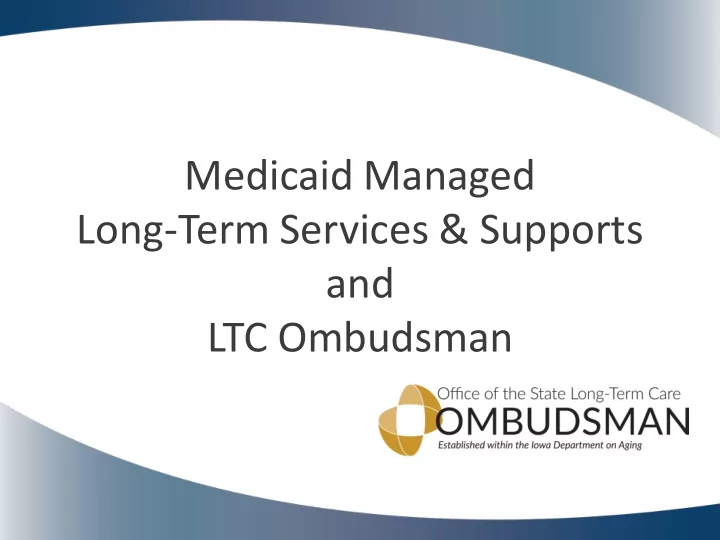

Medicaid Managed Long-Term Services & Supports and LTC Ombudsman
Deanna Clingan-Fischer State Long-Term Care Ombudsman Kelli Todd, Program Manager, Managed Care Ombudsman Program
Iowa’s Office of the State Long -Term Care Ombudsman 1. Long Term Care Ombudsman Program – State , Local and Volunteer LTCO – Volunteer Ombudsman Program Coordinator – Discharge Specialist 2. Managed Care Ombudsman Program – Program Manager – Managed Care Ombudsmen
Iowa’s Long -Term Care Ombudsman Program Authorized by the federal Older Americans Act and the state Older Iowans Act Advocates for residents of nursing facilities and residential care facilities, as well as for tenants of assisted living programs and elder group homes
Iowa’s Managed Care Ombudsman Program Authorized by CMS guidance and the state Older Iowans Act Advocates for Medicaid Managed Care members who reside in health care facilities, assisted living programs and elder group homes as well as those served by one of the seven home and community based (HCBS) waivers
Managed Care Ombudsman Functions Educate and Inform Advocate and Outreach Assist with Grievances, Appeals, and State Fair Hearings Collect Data and Report Develop/Maintain Systemic Collaborations
The beginning….. Iowa decided to transition from traditional fee for service to a Medicaid Managed Care delivery system for long-term services and supports (MLTSS) CMS guidance required an ombudsman function to exist Medicaid agency – Request for Proposal Medicaid agency submitted their waiver – naming our office CMS readiness review and onsite visit
The beginning….. Legislative discussion to provide legal authority to act as managed care ombudsman program Iowa Code authority July 1, 2015 — funding for 2 positions Develop job descriptions to hire Hire staff-Fall 2015: Program manager and one managed care ombudsman Determination to go live-April 1, 2016 Additional legal authority (HIPAA) and funding for additional Ombudsman-July 2016
Managed Care Ombudsman Program (MCOP) Modeling the MCOP from LTCOP best practices and other states Developed a parallel program to the LTCOP Drafted policy and procedures manual Drafted administrative rules Iowa law states MCOP is an independent program not subject to undue influence
Managed Care Ombudsman Program (MCOP) & LTC Ombudsman Interactions All work of the MCOP is conducted with state funds OAA dollars intended for the LTCOP are not used for MCOP The SLTCO oversees all ombudsman activities OSLTCO has a seat at the Medicaid Assistance Advisory Council (appoint MCOP)
Reflections — What needs to be done to implement an MCOP within a LTCOP Learn – About Managed Care Ombudsman roles – About Medicaid; eligibility; waivers – Reach out to other states to learn how their programs operate – Read MCO contracts – Read member handbooks – Referral networks for HCBS members Network — Initial and monthly meetings – Medicaid State Agency – Each MCO – Providers/AAAs – P & A and State Ombudsman programs
Reflections — What needs to be done to implement an MCOP within a LTCOP Determine structure of MCOP – Program Manager —look at systemic issues and serve as “face” of the program – Managed Care Ombudsmen — receive complaints and investigate; work to resolve concerns with each MCO and the Medicaid agency – Determine software/case management /data collection systems – Determine what data needs to be reported to Medicaid agency and CMS-monthly; quarterly and annually
Reflections — What needs to be done to implement an MCOP within a LTCOP Determine how your program will operate and interact with the LTCOP – Referrals — by LLTCO and to LLTCO • Closures • Provision (or lack of) services to residents/members • MDS-Q-transitioning to the community • Involvement with assigned case managers – Review LTCOP policies and procedures — model for MCOP – Disclosure of records/confidentiality standards – Model HIPAA privacy rule for LTCOP (considered health oversight agency) – Joint meetings between LTCOP and MCOP for case consultations – Educational sessions
Reflections — What needs to be done to implement an MCOP--Challenges Creating a program that has general guidance but not guidelines established and has not previously existed in the state Access to CMS — most communication flows through the Medicaid agency and is not direct with MCOP Authority –ensuring all parties understand MCOP’s role, ability to receive confidential information, and to access medical, and administrative records and Medicaid client eligibility data
Recommend
More recommend